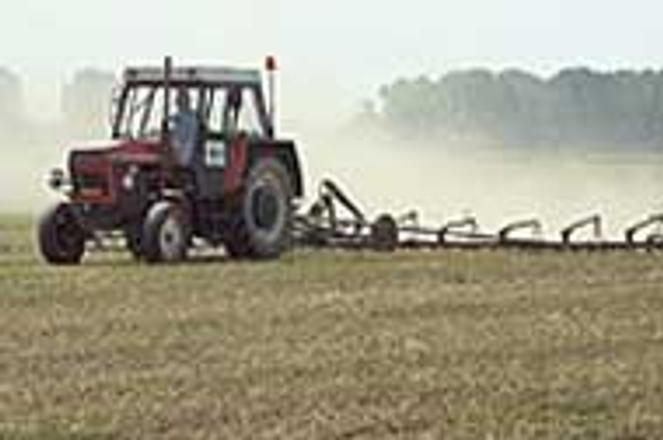The Agriculture Ministry projects that this year's harvest will yield only half of the country's average annual crop.photo: TASR
Weather forecasts across Slovakia have been identical for over a month: sunny and hot with no rain in sight. But while the cloudless skies may be a godsend for sun-worshipers, domestic farmers say they are getting severely burned by what is believed to be the worst drought in the last half-century. Agriculture Ministry officials echoed the farmers' concerns, reporting on May 16 that the extreme hot and dry conditions had to date caused two billion Slovak crowns ($42 million) in damage and lost crops.
According to Jarmila Berečová of the Slovak Meterological Institute, the country's rainfall this year has reached only 30% of the annual average. Meanwhile, the heat wave gripping much of the region has exacerbated the problem. "Since February, over 80% of the day-time high temperatures have been above the average, while 14 of the last 30 days have been record highs, including six days in a row," she said on May 15.
Regional officials with the Agriculture Ministry warned that the country's parched farmlands were expected to produce less than half of a normal year's harvest, in which one hectare yields an average of 4.3 tonnes of wheat. "This is the worst drought in over 50 years," said Jaroslav Mlynár, the head of the Agriculture Ministry's Regional Department in southern Slovakia's Galanta on May 16. "I can only compare it to the summer of 1947, when I was five years old. The conditions were just like this."
The drought is likely to force Slovakia to compensate for the poor harvest by importing wheat, barley and corn, the country's three biggest crops. Paradoxically, because of high foreign subsidies, importing might prove cheaper than producing the crops at home.
Mlynár said that while the crisis created by the drought would not result in a shortage of food, it would cause the country's already struggling farmers further huge economic losses. "Every year, about 10% of all Slovak farmers go bankrupt even in non-drought years," he explained. "For those farmers with no financial reserves, this drought will spell terrible times, and as many as 20% will be forced out of business. We can't look at this drought simply as an economic problem for consumers, because Slovakia has a large agricultural sector which employs 8% of the workforce."
In response to the dire situation, the Agriculture Ministry has announced steps aimed at easing the calamity faced by farmers. On May 12 the ministry launched a plan to sell water for irrigation at 30% of the normal price. Just four days later, the ministry followed the example of the Czech government by giving the water for free.
While such steps have helped, farmers say that it's not enough. In order to irrigate their fields, farmers must also pay for the electricity required for irrigation, a price they say is simply too high. Between 16:00 and 22:00 - a period farmers say is ideal to irrigate - electricity rates are 20 times more expensive than during the rest of the day. In response to the farmers' complaint, the Agriculture Ministry began negotiations with electricity utility Slovenské Elektrárne (SE) to provide farmers with a price break. As of May 17, no deal had yet been reached.
But even if farmers were to receive such a reduction, few if any would likely start irrigating their fields. "There are 53,000 hectares of agricultural soil in the Galanta region, 32,000 hectares of which are equipped for irrigation," Mlynár said. "But only 110 hectares are actually irrigated because of exorbitant expenses incurred through the process."
In an attempt to get more farmers to irrigate their land, the Agriculture Ministry has warned farmers that unless they irrigate, they would not receive further support from the state. This demand has angered local farmers.
"I don't understand what these government people are talking about," said Eduard Bada, who owns a 365 hectare farm in Horné Saliby (Galanta region). "To spray 20 millimetres of water on one hectare of soil costs me 700 crowns ($15), and it's impossible for me to pay this rate."
Bada added that another disadvantage to irrigating was the high risk of having valuable equipment stolen. "This equipment is very expensive and I'm not able to guard it," he said. "If somebody sees me moving my equipment to the fields, the next morning I won't find it there."
For Bada, one hectare of wheat requires an investment of 14,000 crowns ($300), not including the price of irrigation. Average revenues from the harvest, meanwhile, are only 16,500 crowns, leaving a profit of just 2,500 crowns before taxes.
There's no other choice, he said, but to pray for rain. "These kinds of situations are just a normal part of any farmer's life, we have to expect it," he said. "But what really bothers me is when I see how politicians ignore the problems of people like me, while over 80% of their activities are dedicated to their internal political squabbles."


